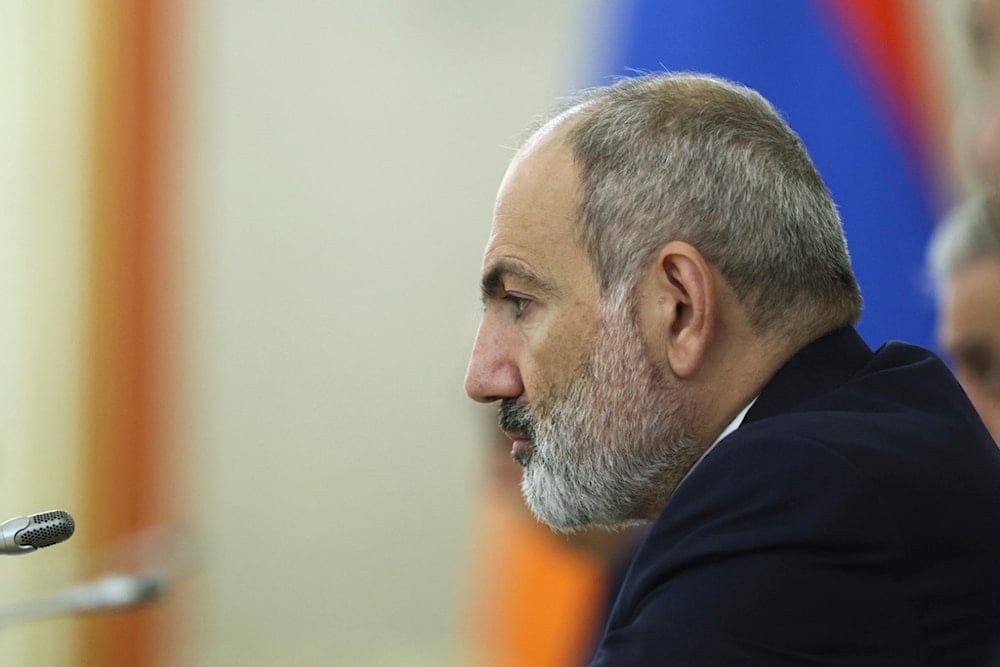Armenia PM weighs constitutional shift to secure peace with Azerbaijan
Nikol Pashinyan says he is ready to amend the Constitution if necessary to finalize a peace agreement with Azerbaijan.
-

Armenian Prime Minister Nikol Pashinyan attends a meeting with Russian President Vladimir Putin on the sidelines of the heads of state of the Commonwealth of Independent States (CIS) summit at the Kremlin in Moscow, Russia, Tuesday, Oct. 8, 2024 (Pool Photo via AP)
Armenian Prime Minister Nikol Pashinyan stated that he is prepared to initiate amendments to the country's Constitution if the Constitutional Court rules against a proposed peace agreement with Azerbaijan.
"We must submit the agreement to the Constitutional Court. No choice here <...>. If the Constitutional Court decides that the agreement runs counter to Armenian laws, then my personal position is that I will initiate introducing changes to the Constitution as I believe that there is no missing out on the opportunity of concluding peace," Pashinyan said in remarks during the Yerevan Dialogue international forum.
Affirming his commitment to a peaceful resolution, Pashinyan added, "There will be peace, and this seems to me a highly obvious scenario." He dismissed any possibility of renewed conflict with Azerbaijan, despite ongoing provocations.
Read more: Armenian premier says peace with Azerbaijan ‘within reach’
Framework of Armenia-Azerbaijan peace agreement
The Armenian leader reiterated Yerevan’s dedication to a peaceful agenda. "We are ready to continue talks with Azerbaijan regarding how we can reach the signing of a peace agreement and other documents that <...> would transform the situation and the fate of the peoples in our region," Pashinyan indicated.
France urges Armenia, Azerbaijan peace deal
France called on Azerbaijan and Armenia to "quickly" sign a finalized peace treaty, after efforts to hammer out an agreement between the two appeared to stall.
"It is essential that this treaty be signed," French Foreign Minister Jean-Noel Barrot said at a press conference in Yerevan alongside his Armenian counterpart Ararat Mirzoyan.
"I now hope... that we can quickly move toward its signing."
Reaffirming France's commitment to supporting Armenia's territorial integrity and sovereignty, Barrot also pledged to continue defence cooperation with Yerevan, an arrangement that has angered Baku and Moscow.
"All this is solely aimed at helping Armenia acquire the means to defend its population, its territorial integrity, and its sovereignty," he said.
France has previously supplied Armenia with military equipment, including CAESAR self-propelled howitzers, stirring Russian concerns.
Last week, Russian Foreign Minister Sergey Lavrov raised concerns about Armenia's military ties with France.
What happened?
On March 13, Armenia’s Foreign Ministry announced that the two sides had finalized the text of the Armenia-Azerbaijan peace agreement. Yerevan expressed readiness to discuss a venue and timeframes for signing the treaty.
Meanwhile, Azerbaijan has laid out several preconditions. Azerbaijani Foreign Ministry Spokesperson Aykhan Hajizada stated that a formal agreement could only be signed if there is a halt to border shootings and Armenia amends its Constitution to remove any territorial claims over Karabakh.
Azerbaijan also calls for the dismantling of the OSCE Minsk Group, labeling it as outdated. Yerevan, however, rejects Baku’s accusations and demands.
Pashinyan has stated that such constitutional changes would require a national referendum, which cannot take place before 2027. Nevertheless, he is advocating for the deal to be signed sooner.
Historical background
Over the past four decades, Armenia and Azerbaijan have fought two wars over Karabakh, a mountainous, Armenian-populated region that is internationally recognized as part of Azerbaijan.
In a 24-hour military operation in September 2023, Baku regained full control of the territory, prompting 100,000 ethnic Armenians to flee.
Finalizing a deal to normalize relations would represent a significant breakthrough in a region where Russia, the European Union, the United States, and Turkey are all competing for influence.
Read more: Overwhelming Azerbaijani support for peace treaty with Armenia: Poll
Opposition and legal challenges
Despite government efforts, Armenia’s major opposition forces have criticized the treaty, describing it as a "capitulation of the Pashinyan regime."
No coordinated or official version of the agreement has yet been released by either Armenia or Yerevan. The final outcome may hinge on the Constitutional Court’s interpretation of the treaty’s compatibility with the current Armenian legal framework.
Read more: Armenia moves closer to EU membership, risking fallout with Russia

 4 Min Read
4 Min Read










